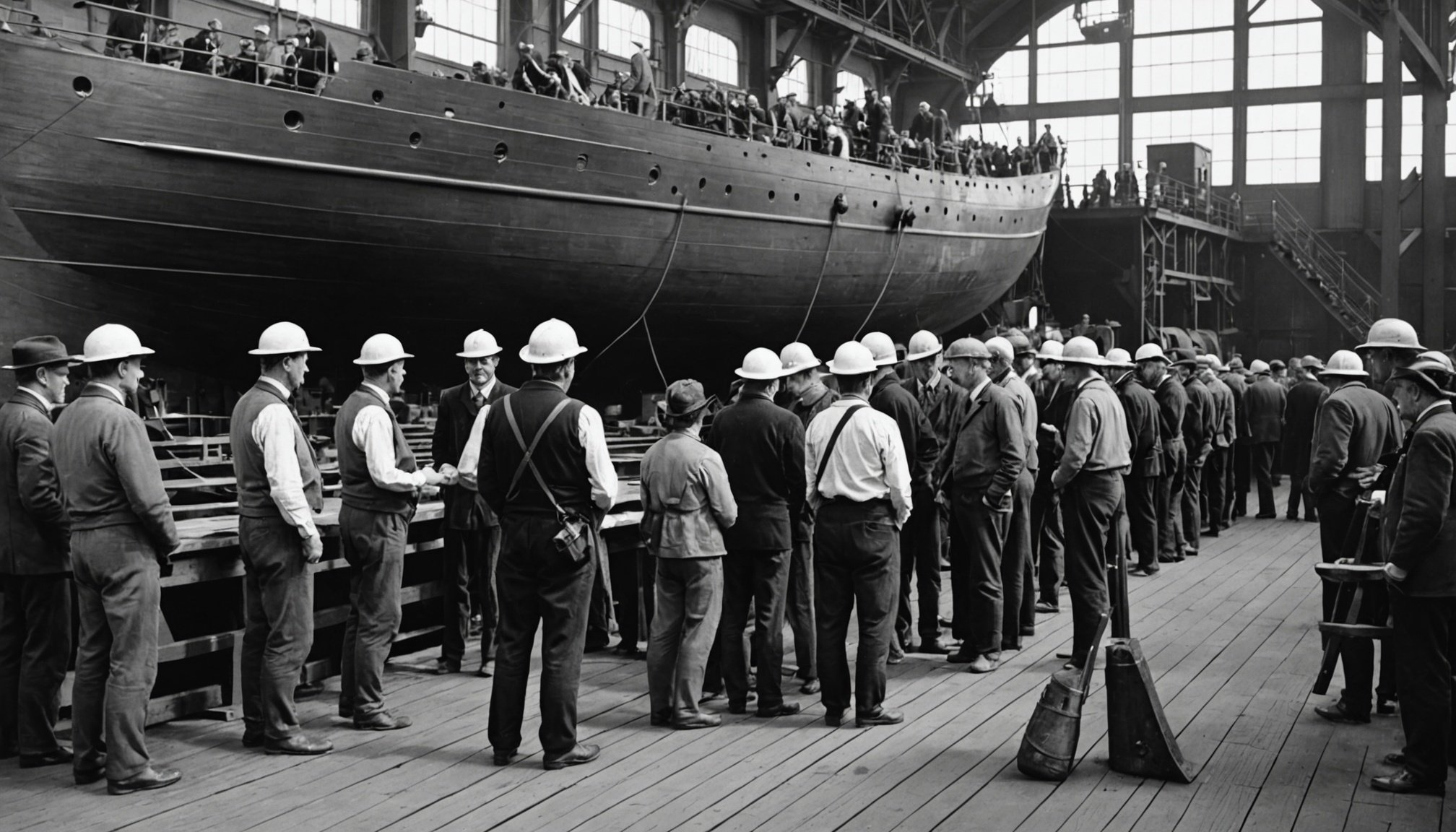Overview of British Shipbuilding History Workshops
Exploring the rich tapestry of British shipbuilding history can be both educational and engaging, offering insight into an industry that shaped the maritime world. These workshops offer a glimpse into a time when shipyards played a pivotal role in global trade and naval supremacy. Participants gain not only historical perspective but a real sense of the shipbuilding process itself.
The diversity of workshops available today invites participants to delve into various aspects of shipbuilding. From traditional wooden vessel construction to the more modern steel engineering techniques, there is something to cater to all interests. Practical sessions, such as model ship assembly or rigging practice, highlight the craft’s complexity and offer participants a tangible connection to the past.
Also read : Journey through the edwardian era: uncover the enchantment of heritage train adventures
Hands-on learning is vital in these workshops, fostering both understanding and appreciation for the intricacies involved in ship construction. Such experiential engagement helps bridge the gap between theoretical knowledge and practical application. Participants leave with greater appreciation for the craftsmanship and technological advancements that have continuously evolved within the industry.
By focusing on both historical context and practical engagement, these workshops ensure a grounded and comprehensive learning experience for all ages and interests involved in British shipbuilding history.
In the same genre : Explore the Top UK Cities for Captivating Brewery History Tours
Types of Workshops Available
Delve into the diverse workshop types that enhance both knowledge and skill sets through engaging and insightful experiences. These educational programs are specially designed to cater to various interests and learning goals. Below, explore the exciting dimensions these workshops offer:
Practical Skills Workshops
Practical Skills Workshops are designed to arm participants with valuable, hands-on experiences. They cover skills such as woodworking, sail-making, and navigation, tailored for both beginners and seasoned enthusiasts. These workshops cater to varied skill levels, ensuring that everyone gains a worthwhile experience. Participants can expect sessions ranging from quick, intensive courses to extended series. Formats include immersive in-person gatherings and virtual classes, allowing flexibility in learning.
Historical Insight Workshops
Dive deep into history with Historical Insight Workshops, which span intriguing topics like historic shipbuilding or marine exploration. Led by esteemed instructors and guest speakers, these workshops offer rare, firsthand knowledge. Hosted in unique venues such as maritime museums or authentic historic sites, attendees relish an unforgettable educational experience.
Thematic Explorations
Engage in Thematic Explorations, covering specialized themes like naval architecture or maritime archaeology. These programs feature interactive elements like live demonstrations and hands-on artifact analysis, fostering active participation. Often, these workshops are in collaboration with museums or local historical societies, enriching the learning journey through community involvement.
Locations for Workshops
When choosing workshop locations, several factors should be considered to ensure they meet the needs of participants. In the UK, renowned venues include The Royal Society in London, the National Museum of Scotland in Edinburgh, and the Millennium Point in Birmingham. These places offer rich historical and educational experiences, making them desirable sites of interest for attendees.
Regionally, the UK offers a broad range of options that vary in terms of local culture and educational focus. For example, locations in Scotland may focus on history and nature, while those in London could provide access to cutting-edge technology and innovation. Therefore, selecting a venue that aligns with the workshop’s objectives is crucial.
Accessibility is another significant aspect when organizing workshops. Many modern venues are equipped with facilities that accommodate individuals with disabilities, such as ramps, elevators, and accessible restrooms. Additionally, convenient access to public transportation can enhance the experience for all participants by reducing logistical challenges.
- Consider venues close to major transport hubs
- Ensure facilities cater to diverse needs
- Opt for venues offering acclaimed local attractions
Selecting the right venue can significantly impact the effectiveness and appeal of any workshop.
How to Join and Register
Embarking on the journey to join our workshops requires a clear registration process. To begin, visit our website and locate the ‘Register’ section. Here, you’ll find a step-by-step guide designed to make the registration process straightforward. Ensuring you have all necessary information, follow these steps:
- Fill out the registration form with personal and contact details.
- Select the workshops you wish to attend from the offered list.
- Review your choices and proceed to the payment page.
Registration fees are outlined during the process, providing transparency about costs. Various payment options are available, including credit cards and PayPal, catering to your convenience.
Regarding participant requirements, specific prerequisites or recommended backgrounds might enhance your experience. For example, workshops focusing on advanced techniques could suggest prior knowledge or experience in the field. This information is crucial for tailoring your participation to your skill level.
After completing these steps, you’ll receive a confirmation email with additional details about the workshop schedule. This includes joining instructions and tips to help you prepare. The entire process ensures ease of access and comprehensive guidance for all participants, aiding in a satisfying and educational experience.
Workshop Cost and Duration
Understanding the workshop costs and time commitment is crucial when planning to enrol in a workshop. The price of a workshop can vary significantly based on the type and level of the course. Generally, beginner-level workshops may be priced lower, while advanced or specialised sessions tend to be more costly. It is advisable to compare different options to find better pricing details.
When considering the duration, workshops can last anywhere from a few hours to several weeks. The time commitment required often depends on the workshop’s objectives and complexity. Many providers offer flexible scheduling options, including evening and weekend sessions, allowing participants to balance learning with other obligations.
Potential savings are also worth exploring. Many institutions offer discounts for early registration or group enrolments. Some may provide funding opportunities or scholarships to reduce financial burdens. Engaging with these options can make workshops more accessible without compromising on quality or commitment levels.
Being informed about the costs, available scheduling, and possible financial support can help you make a more confident and well-informed decision about your next educational step.
Testimonials and Successful Experiences
In the realm of workshop feedback, participants often share insightful testimonials that highlight transformative experiences. This feedback not only provides a glimpse into their journeys but also underscores the tangible outcomes of the workshops.
Overview of Feedback from Past Participants
Recent participant testimonials reveal a consistent theme of enthusiasm and satisfaction. Many attendees express how the workshops have exceeded their expectations. For example, one participant stated, “The workshop gave me the confidence and tools to pursue my career goals with renewed vigour.”
Impactful Experiences and Learning Outcomes
Success stories abound from these events. A significant number of participants report practical applications of what they have learned. They note improvements in both professional and personal growth, emphasizing how the knowledge gained has been seamlessly integrated into their daily routines. Participants often mention enhanced skills in communication and problem-solving.
Quotes from Participants about Their Journey
- “The hands-on activities were engaging and insightful, making the complex content accessible.”
- “I left the workshop feeling empowered and motivated to take action.”
These success stories and positive reviews validate the workshop’s role in providing valuable learning experiences. They ensure future participants can approach with confidence, drawing from the rich tapestry of past participant insights.
Additional Resources for Learners
For those interested in diving deeper into British shipbuilding, numerous historical resources beckon. Exploring these will enrich your understanding and appreciation of the industry’s rich legacy. Here are some avenues to consider:
Recommended Books and Articles
- “The Rise and Fall of the British Shipbuilding Industry” by Anthony Burton provides an insightful chronicle of the industry’s evolution.
- “Britain’s Maritime Heritage” discusses the nation’s shipbuilding milestones and their global impact.
Online Resources and Archives
- The National Maritime Museum’s digital archives offer documents and imagery that chronicle shipbuilding achievements.
- The British Library’s online collections house essays and articles, enabling further reading on maritime history.
Community Engagement
Participating in community events related to maritime history is a fantastic way to engage with like-minded individuals. Look for lecture series or groups focused on maritime heritage such as:
- The British Shipbuilding and Maritime Industries Society, which hosts workshops and discussions regularly.
- Local history groups frequently organize tours and talks, offering a social gateway to the industry’s storied past.
Harness these resources to forge a well-rounded perspective on British shipbuilding, expanding knowledge through active engagement and continued study.











